Chronic Stress and Anxiety Understanding, Managing, and Overcoming In today’s fast-paced world, chronic stress and anxiety have become increasingly common, affecting millions of people worldwide. Understanding the causes, symptoms, and effective management strategies is crucial for maintaining both mental and physical health. The Impact of Chronic Stress on Mental and Physical Health Chronic stress occurs when the body remains in a prolonged state of heightened alertness, leading to a range of health issues. This persistent state of stress can result in anxiety, depression, and other mental health disorders. Additionally, it can manifest in physical symptoms such as headaches, digestive problems, and cardiovascular diseases. Causes of Chronic Stress and Anxiety Several factors contribute to chronic stress and anxiety, including: Work-related Pressure: Long hours, high expectations, and job insecurity can lead to significant stress. Financial Issues: Constant worries about money and financial stability are major sources of stress. Personal Relationships: Conflicts and lack of support in personal relationships can exacerbate stress levels. Health Concerns: Chronic illnesses and health-related fears contribute significantly to ongoing stress. Life Changes: Major life events such as moving, divorce, or loss of a loved one can trigger chronic stress and anxiety. Recognizing the Symptoms Identifying chronic stress and anxiety symptoms is the first step towards effective management. Common symptoms include: Persistent worrying and overthinking Sleep disturbances and insomnia Fatigue and lack of energy Irritability and mood swings Difficulty concentrating Physical symptoms like headaches, muscle tension, and stomach issues Effective Strategies for Managing Stress and Anxiety Managing chronic stress and anxiety requires a comprehensive approach that includes lifestyle changes, coping strategies, and professional help when necessary. Here are some effective methods: Lifestyle Changes: Regular Exercise: Physical activity releases endorphins, which help reduce stress. Healthy Diet: Eating a balanced diet can improve overall well-being and reduce stress levels. Adequate Sleep: Prioritizing sleep is crucial for mental and physical health. Mindfulness and Meditation: Practicing mindfulness and meditation can help calm the mind and reduce anxiety. Coping Strategies: Time Management: Effective time management can reduce feelings of overwhelm. Social Support: Building a support network of friends and family can provide emotional relief. Relaxation Techniques: Techniques such as deep breathing, progressive muscle relaxation, and yoga can help manage stress. Hobbies and Interests: Engaging in hobbies can provide a healthy distraction and improve mood. Professional Help: Therapy: Cognitive-behavioral therapy (CBT) is particularly effective for treating anxiety and stress. Medication: In some cases, medication may be necessary to manage symptoms. Support Groups: Joining support groups can provide a sense of community and understanding. Conclusion: Overcoming Stress and Anxiety While chronic stress and anxiety are challenging, they are manageable with the right strategies and support. Understanding the underlying causes, recognizing symptoms, and implementing effective management techniques can significantly improve one’s quality of life. If you are struggling with chronic stress and anxiety, don’t hesitate to seek professional help to guide you on the path to recovery. By taking proactive steps and prioritizing self-care, you can overcome chronic stress and anxiety and lead a healthier, more fulfilling life. Conquering Chronic Fatigue Syndrome All Posts Mind Case Study History of Hypnotherapy 25 July 2024/No Comments History of Hypnotherapy From Ancient Roots to Modern Practice The Fascinating History of Hypnotherapy: From Ancient Roots to Modern Practice… Read More Naked and Afraid: 25 July 2024/No Comments Naked and Afraid: Why Physical Preparation Isn’t Enough Naked and Afraid: Why Physical Preparation Isn’t Enough When faced with extreme… Read More Hypnotherapy for Stress Relief 25 July 2024/No Comments Hypnotherapy for Stress Relief The Transformative Power of Hypnotherapy for Stress Relief Hypnotherapy for Stress Relief In today’s fast-paced world,… Read More Load More End of Content.
Treating Stress and Anxiety with Hypnotherapy Understanding the Benefits of Hypnotherapy for Stress and Anxiety Management Discover how hypnotherapy can be an effective tool for managing stress and anxiety, promoting relaxation, and improving mental well-being. In today’s fast-paced world, stress and anxiety have become companions in our daily lives. The pressures of work, relationships, and various responsibilities can often leave us feeling overwhelmed. While there are numerous strategies for managing stress and anxiety, one powerful yet often underexplored approach is hypnotherapy. In this comprehensive guide, we’ll delve into the world of hypnotherapy and discover how it can be a valuable tool in alleviating the burdens of stress and anxiety. Exploring the Benefits and Synergy of Hypnotherapy and Reiki Treating Stress and Anxiety with Hypnotherapy Understanding Stress and Anxiety Before we explore how hypnotherapy can help, it’s crucial to understand what stress and anxiety entail. Stress is our body’s natural response to a perceived threat or challenge, triggering the “fight or flight” reaction. Anxiety, on the other hand, is a more persistent state of apprehension or uneasiness, often without a specific cause. Both can take a toll on our physical and mental well-being. How Does Hypnotherapy Work? Hypnotherapy is a therapeutic technique that uses guided relaxation and focused attention to access the subconscious mind. Contrary to popular belief, it’s not about losing control but rather gaining control over your thoughts and behaviors. During a hypnotherapy session, a trained therapist helps you achieve a state of deep relaxation, making you more receptive to positive suggestions and reframing negative thought patterns. Facebook Youtube Linkedin Youtube The Role of Hypnotherapy in Stress Reduction Identifying Triggers: Through hypnotherapy, you can uncover the root causes of your stress. This self-awareness is the first step in managing and mitigating stressors. Stress Reduction Techniques: Hypnotherapy equips you with effective stress reduction techniques. You learn how to relax your mind and body, which can be invaluable in high-pressure situations. Positive Visualization: Hypnotherapy helps you visualize a calmer, stress-free version of yourself. This mental rehearsal can lead to improved resilience and coping mechanisms. Treating Stress and Anxiety with Hypnotherapy Hypnotherapy for Anxiety Management Addressing Underlying Anxiety: Often, anxiety stems from underlying fears or unresolved issues. Hypnotherapy can help identify and address these concerns. Calming the Mind: Hypnosis induces a profound state of relaxation, calming the incessant “chatter” of an anxious mind. Replacing Negative Thoughts: Hypnotherapy replaces negative thought patterns with positive, constructive beliefs. Over time, this can lead to lasting anxiety relief. Scientific Backing Hypnotherapy’s effectiveness in stress and anxiety management is supported by scientific research. Numerous studies have shown that hypnosis can significantly reduce stress levels, lower anxiety, and improve overall well-being. Meta-analysis on the Efficacy of Hypnotherapy in Depression Treatment: Montgomery, G. H., & DuHamel, K. N. (2007). Reducing the Stress of Breast Cancer: A Prospective Randomized Controlled Multisite Trial of Hypnosis and Group Therapy. Journal of Clinical Oncology, 25(18), 2700–2706. Clinical Study on the Use of Hypnotherapy in Depression Treatment: Alladin, A. (2010). Evidence-Based Hypnotherapy for Depression. International Journal of Clinical and Experimental Hypnosis, 58(2), 165–185. Meta-analysis of Hypnotherapy Efficacy in Depression Treatment in Children and Adolescents: Stoelb, B. L., & Molina, A. (2013). Efficacy of clinical hypnosis: A summary of its empirical evidence. PAIN® Clinical Updates, 21(1), 1–9. Study on Hypnotherapy and Mood Improvement: Yexley, M., & Abbot, N. C. (2007). The Experience of Hypnosis for Depression: A Focussed Review. Counselling and Psychotherapy Research, 7(2), 82–90. Getting Started with Hypnotherapy If you’re considering hypnotherapy for stress or anxiety, it’s essential to find a qualified and experienced hypnotherapist. During your initial consultation, discuss your concerns and goals. Together with your therapist, you’ll create a personalized treatment plan. Conclusion In the journey to overcome stress and anxiety, hypnotherapy can be a powerful ally. Its ability to access the subconscious mind and reframe thought patterns makes it a valuable tool for achieving lasting relief. If you’re ready to embark on a path towards a calmer, more relaxed life, consider exploring the benefits of hypnotherapy. Remember, you have the power to take control of your stress and anxiety, and hypnotherapy can be the key to unlocking that potential. Book Your Session Schedule your first hypnotherapy session today and start your journey to a stress-free life. Opinions Mateusz Bajerski DHP Acc. Hyp., BA Philosophy-Interpersonal Communication, MA Cognitive Science Are you ready to unlock your full potential and transform your life for the better? Look no further! As a dedicated Personal Trainer, Mentor, and Hypnotherapist, I’ve spent years helping individuals just like you make lasting positive changes. My passion is your success, and I take a personal interest in each and every one of my clients. I firmly believe that everyone possesses the power to enhance their life, and I’m here to help you harness that power. My approach is friendly, supportive, and tailored to your unique needs. My mission is to create a safe and comfortable environment where you can fully relax and embrace change. Services: Personal Training Mentorship Hypnotherapy Join me on this incredible journey of self-discovery and transformation. Together, we can turn your dreams into reality. Member of the Professional Hypnotherapy Practitioner Association Contact me today and let’s get started! Book Your Session Previous PostNext Post
Tips to Help You Manage Stress In the hustle and bustle of our modern world, where time ticks by in a perpetual race, and demands seem never-ending, finding moments of serenity can feel like an impossible feat. Yet, within the whirlwind of daily life, there exists an oasis of calm waiting to be discovered. Welcome to our guide on relaxation techniques – a treasure trove of wisdom and practices that can help you navigate the stormy seas of stress and find your way back to tranquillity. Picture this: a life where the relentless pressures of work, relationships, and responsibilities no longer weigh you down. Instead, you possess the tools to calm your mind, soothe your spirit, and recharge your body. It’s not an unattainable dream; it’s a reality within your grasp. With the right guidance, you can unlock the secrets of relaxation and embrace a newfound sense of balance and peace. Physical Activity: The first and crucial piece of advice is regular physical activity. You don’t need to run marathons; a daily walk or yoga can improve your well-being and reduce stress. Dance: Choose your favorite music – opt for calm, soothing tunes that promote relaxation. Good music sets the atmosphere and helps you disconnect from daily worries. Create Your Space: Find a quiet and comfortable place where you can dance. It could be a spacious living room, bedroom, or even your garden. It’s essential to feel at ease and focus on yourself. Mindful Breathing: During dance sessions, concentrate on your breathing. Try to synchronize your movements with your breath, helping you stay in the present moment and quiet your mind. Close Your Eyes: If you feel comfortable, try dancing with your eyes closed. This will help you disconnect from external stimuli and focus on your inner experiences. Discover Your Style: You don’t have to be a professional dancer; this is your space to express yourself naturally. Concentrate on what you feel, not how you look. Release Emotions: Dance can be a way to release pent-up emotions. Allow yourself to express joy, sadness, or frustration through movement. End Gently: After a few minutes of dancing, gradually slow down your movements until you reach a peaceful standstill. Focus on your breath and savor the feeling of relaxation. Facebook Youtube Linkedin Youtube Meditation: Another way to manage stress is through meditation. Meditation can help calm the mind, reduce tension, and improve concentration. You don’t need to meditate for hours; just a few minutes a day can yield positive results. Breathing Techniques: Another effective way to reduce stress is through relaxation techniques. Deep breathing, progressive muscle relaxation, or yoga are a few examples of how you can care for your mental health. Quick Inhale, Slow Exhale: Focus on slow, deep inhalations through your nose, filling your lungs with air. Then, exhale slowly through your mouth, releasing tension and stress from your body. Abdominal Breathing: Place your hands on your abdomen. Inhale deeply, pushing your abdomen forward, and exhale slowly, allowing it to fall. This technique helps oxygenate your body more effectively. 4-7-8 Breathing: Inhale through your nose for 4 seconds, hold your breath for 7 seconds, and then exhale through your mouth for 8 seconds. Repeat several times. This can help calm your nervous system. Alternate Nostril Breathing: Cover one nostril with a finger and gently inhale through the other, then hold your breath for a moment before exhaling through the second nostril. This technique is commonly used in yoga and can help balance your energy. Acceptance: Don’t worry about things beyond your control. Focus on the issues you can solve and allow yourself time for relaxation and rest. Understanding Acceptance: Start by understanding that acceptance doesn’t mean giving up on improvement or change. It’s more about understanding and agreeing with what is at the moment, without excessive resistance or negative emotions. Positive Affirmations: Repeat positive affirmations related to acceptance, like “I accept myself as I am” or “Understanding leads to peace.” Natural Processes: Accept that life consists of changes, both positive and negative. These are natural processes that contribute to our journey. Gratitude: Every day, reflect on the things you’re grateful for. This helps focus on the positive aspects of life and accepting what you already have. Patience: Remember that the process of acceptance may take time. Be patient with yourself and your feelings. Acceptance is a skill that can bring tremendous benefits in relaxation and stress management. It’s a process that you can gradually develop and refine, with the results evident in your overall well-being and peace of mind. Diet: Limit caffeine and alcohol consumption, set realistic goals, and find a hobby or activity that brings you joy. These are simple ways to reduce tension and relax after a challenging day. Cocoa as a Natural Relaxation Aid: Cocoa, especially in the form of high-cocoa-content chocolate, can genuinely help reduce stress and improve mood. It contains certain compounds that affect our nervous system and induce relaxation. Here’s how you can use good cocoa as a relaxation aid: Choose High-Quality Cocoa: Opt for high-cocoa-content chocolate products, preferably above 70%. The higher the cocoa content, the more health benefits, such as antioxidants. Moderation: While good cocoa can be relaxing, remember that excessive sugar and calories can impact your health. Consume in moderation. Warm Cocoa Drink: Prepare a warm cocoa-based beverage. You can add a teaspoon of cocoa to hot (preferably plant-based) milk and, optionally, a touch of natural sweetener. Sip it slowly, focusing on the taste and aroma. Indulge in the rich, velvety taste of pure cocoa – a sensory delight that will elevate your every moment. Relaxation Ritual: Preparing and savoring a warm cocoa drink can become a relaxation ritual. Find a quiet place, disconnect from electronics, and dedicate a moment to enjoy your beverage mindfully. Observe Effects: Some people experience a sense of comfort after consuming high-quality chocolate. This is linked to compounds like theobromine and phenylethylamine, which can influence our mood. Health Note: While good cocoa can help reduce stress,




